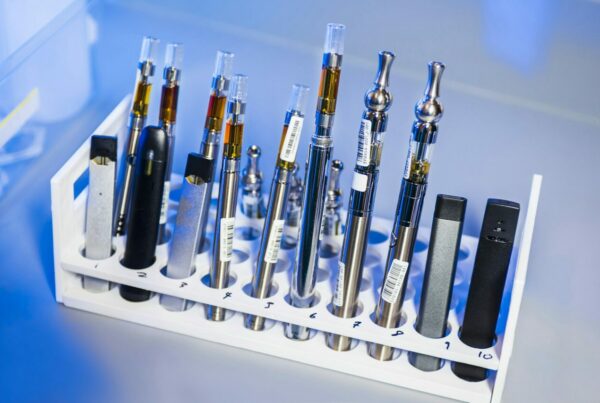N, N-Dimethyltryptamine (DMT) is a compound commonly found in both plants and animals, known for its potent yet transient psychedelic effects when ingested.
Mounting evidence implies that DMT, naturally present in the body, plays crucial roles in the peripheral and central nervous systems and might function as a neurotransmitter.
DMT can trigger powerful psychedelic effects, but it usually doesn’t result in many negative effects, except for potential cardiovascular problems when administered in large doses via injection.
Let’s explore DMT and its diverse roles. These roles range from recreational use to its promising potential in scientific research and therapeutic applications.

A Brief Introduction to DMT: What is it?
| Aspect | Details |
| Name | N, N-Dimethyltryptamine (DMT) |
| Classification | Indole alkaloid |
| Occurrence | Occurs naturally in various plants and animals |
| Psychoactive Effects | Induces brief, intense psychedelic experiences when ingested. |
| Method of Consumption | Can be smoked, injected, or consumed orally. |
| Duration of Effects | Short-lived, generally lasting from 5 to 30 minutes. |
| Chemical Structure | Composed of a tryptamine core with two methyl groups attached to the amine nitrogen atom. |
| Metabolism | Rapidly metabolized by the body, broken down by monoamine oxidase (MAO). |
| Cultural Use | Historically used in various ceremonial and shamanic rituals by indigenous cultures. |
| Other names | Dimitrifantasiabusinessman’s tripBusinessman’s special45-minute psychosisspiritual molecule |
The Importance of DMT in Mental Health
N, N-Dimethyltryptamine (DMT), a compound known for its potent psychedelic effects, is gaining attention for its potential benefits to mental health. Despite its traditional image of inducing intense visionary experiences, recent studies suggest a connection between DMT and mental well-being.
Influence on Psychological and Emotional Well-being
DMT is known to provoke deep emotional responses and alter states of consciousness. These effects could potentially serve as therapeutic tools for addressing mental health issues, aiding emotional processing, and offering new perspectives on personal traumas.
Neuroplasticity and Brain Function
Research suggests that DMT may influence neuroplasticity, thereby enhancing the brain’s ability to adapt and reorganize. Studying its impact on synaptic plasticity and neural connectivity might open up potential treatments for conditions associated with neural maladjustment.
Potential Therapeutic Applications for Mental Health Disorders
Initial studies underscore the potential utility of DMT in treating disorders such as depression, addiction, and PTSD. Its ability to evoke mystical or spiritual experiences could represent a novel approach to psychotherapy and aid in restructuring negative thought constructs.
Investigation into the natural presence of DMT within the body highlights its role in fostering mental health resilience, stress management, and overall psychological well-being. Understanding how the body modulates its internal DMT levels could lead to novel therapeutic strategies.
DMT and Mental Health Disorders
| Mental Health Disorder | Definition | Effectiveness of DMT | Benefits |
| Depression | A mood disorder characterized by persistent sadness, a lack of interest, and reduced motivation | Preliminary studies suggest DMT might help alleviate symptoms by provoking deeply emotional experiences. | Its rapid onset and ability to trigger transformative experiences could provide new and unique therapeutic approaches for reshaping negative thought patterns and enhancing emotional processing |
| Post-Traumatic Stress Disorder (PTSD) | A mental health disorder triggered by traumatic events, resulting in flashbacks, severe anxiety, and intrusive thoughts | Early research indicates DMT’s potential to manage symptoms by evoking spiritual or mystical experiences that could help patients reframe traumatic memories | DMT’s potential to induce altered states of consciousness could aid emotional processing and provide a fresh perspective on traumatic experiences |
| Addiction | A complex disorder characterized by compulsive engagement in rewarding stimuli, despite negative consequences | Certain studies suggest DMT’s potential role in interrupting addictive cycles and reducing cravings for substances | DMT’s capacity to provoke intense and transformative experiences could help individuals modify their behavioral patterns and confront their addiction’s underlying causes |
Approaches to Using DMT
DMT, recognized for generating short yet profound psychedelic encounters, can be administered in several manners. The chosen method frequently depends on the desired intensity and length of the experience.
Smoking:
When DMT is smoked in a pipe or vaporized, it’s crucial to manage the temperature carefully to avoid overheating and burning the compound. The psychedelic experience commences almost instantly when DMT is smoked, usually lasting from 5 to 15 minutes.
Oral Intake:
When DMT is consumed orally, the effects begin more slowly but last considerably longer, often several hours. This is due to DMT’s slower decomposition when mixed with an MAOI.
Injection:
DMT can be directly injected into the bloodstream for rapid and potent effects.
This approach leads to an instant and powerful experience, but it necessitates precise dosing and carries greater risks.
Insufflation (Snorting):
Snorting DMT results in a slower onset of effects compared to smoking, but it might provide a more prolonged experience.
Sublingual or Buccal Administration:
When DMT is absorbed via the oral mucosa, it provides an alternative to smoking and gives a protracted, although less intense, encounter.
Determining Therapeutic Dosage: N, N-Dimethyltryptamine (DMT)
For smoking, the proposed dosage ranges from 20 to 40 mg. For intravenous administration, the suggested dosage is 0.2 to 0.4 mg per kg of body weight. These dosage recommendations are primarily relevant to clinical research and particularly significant for intravenous administration.
- Higher doses given intravenously are associated with vivid visuals, temporary loss of control, and a combined state of anxiety and euphoria
- Interestingly, lower doses have been found to produce less favorable effects
- Recreational doses of smoked DMT typically vary from 40 to 50 mg, occasionally even going up to 100 mg
- Different amounts of intravenous Reports have suggested that the use of DMT (available in solutions of 7, 14, 18, and 20 mg) can lead to near-death experiences, resulting in significant, enduring enhancements in psychological health.
Availability of DMT
ProductsOsmosis – 4-ACO-DMT Ethereal Essence Tincture
This tincture, marketed as containing the DMT variant 4-Acetoxy-N, N-dimethyltryptamine (4-AcO-DMT), is a liquid extract intended for oral use. It could potentially offer a novel experience compared to conventional DMT.
Lucid Supply Co. – 5-MeO DMT Vaporizer
This product is a vaporizer delivering 5-Methoxy-N, N-dimethyltryptamine (5-MeO-DMT), a compound renowned for its potent, transformative, and often brief experiences due to its active ingredient, 5-MeO-DMT.
Integral Alchemist – Acacia – 1ml DMT Vape Cartridge
The DMT vape cartridge by Integral Alchemist comes pre-loaded with N, N-Dimethyltryptamine. This product is likely designed for those who favor a subtle and convenient form of DMT administration.
Deadhead Chemist – 5-Meo-DMT Cartridge
This cartridge houses 5-Methoxy-N, N-dimethyltryptamine (5-MeO-DMT), a compound noted for its deep and powerful impacts.
Mental health benefits could potentially be linked to personal growth, spiritual experiences, or therapeutic applications aimed at enhancing emotional well-being.
Deadhead Chemist – N, N DMT Cartridge
This is another product from Deadhead Chemist, which contains the classic N, N-Dimethyltryptamine. Cartridges offer a user-friendly approach to DMT consumption, providing a more consistent and controlled experience.
Concluding Remarks
The application of N, N-Dimethyltryptamine (DMT) in
How can you ensure the responsible and safe use of DMT?
It’s vital to understand that the use of DMT should be guided by ethical considerations and a commitment to safety. This includes being aware of legal implications, potential health risks, and the importance of being in a secure and supportive environment during the experience.
Mental health therapy is a fascinating yet complex journey. The substance’s ability to induce powerful but brief psychedelic episodes creates opportunities for unique therapeutic approaches.Early studies point towards its potential role in emotional processing, personal development, and possibly
The profound influence of mental health therapy requires careful consideration and responsible usage.
For individuals keen on responsibly exploring DMT products, reliable sources like Magic Mushrooms Vancouver Canada Online Dispensary are available to guide and offer a variety of options.
Frequently Asked Questions:
How do different DMT products affect mental health?
For instance, vaporizers may yield immediate effects, while tinctures or vape cartridges could provide more controlled and consistent doses.
Incorporating derivative compounds or 5-MeO-DMT can result in varying intensities and different types of mental health impacts.
These nuanced differences underline the importance of selecting a DMT product based on individual preferences and mental health goals.
Can DMT lead to enduring changes in mental health and personal growth?
There’s anecdotal evidence proposing that DMT-induced experiences could have persistent effects on mental health and personal development.
Highly significant or transformational experiences, such as those similar to near-death experiences, are frequently associated with reported ongoing positive changes in psychological health and personal development.
Even though these experiences are intense and transient, they often prompt introspection, spiritual revelations, and a sense of unity or enlightenment.
Users often report a refreshed perspective on life, enhanced emotional resilience, and an elevated appreciation for life following these experiences.
What’s the optimal way to use DMT for mental health purposes?
It is essential to make informed decisions, including conducting comprehensive research and understanding the effects of the substance.
Advice from mental health professionals or experienced users can provide crucial perspective into potential risks and advantages.
Recognizing personal tolerance and mental preparedness is also extremely important, in addition to ensuring a supportive and safe environment for the experience.
How does DMT stack up against other mental health therapeutic psychedelics such as psilocybin or LSD?
DMT’s impacts, length, and intensity are distinct from other psychedelics like psilocybin or LSD, particularly in its shorter duration.
High intensity, short-acting psychedelics like DMT offer unique experiences that require specialized therapeutic strategies in mental health, which are different from those used for longer-lasting psychedelics.
Recommended Additional Resources:





